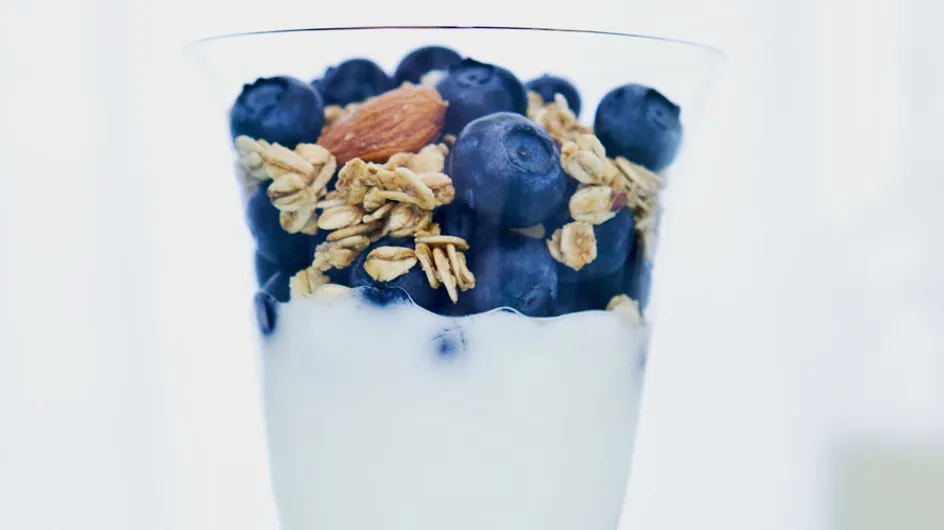We're constantly told that full-fat foods is a no-go zone, apparently causing heart disease, weight gain and all round nasty health problems. And because of this, we've feared full-fat foods for decades. Our say? MYTH.
In fact, most of the time when we switch to low-fat they're actually less healthy than their full-fat versions. The reason being that low fat options often contain just as much fat as their whole fat counterparts by adding sugars, additives and fillers. The truth is we CAN eat full-fat natural foods. They're REAL, whole and totally healthy.
Don't believe us? We got in touch with NutriCentre nutritionist, Katy Mason who helped us dispel the myths about full fat foods and lead us on the right track to a healthier lifestyle.
Trust us, you won't regret this!
Eggs
Eggs have had it pretty bad in the media in recent years. Its bad rap comes mainly from people making the wrong assumption that eggs can affect your cholesterol levels just because eggs contain cholesterol. But, this is far from true.
Katy says, “The choline in the egg yolk actually helps prevent the accumulation of cholesterol and fat in the liver! Egg yolks are a fabulous source of choline (as phosphatidyl choline), which is the universal ‘building block’ for ALL cell membranes – especially important for the brain!”
And that's not all. Egg whites "contain adequate amounts of all essential amino acids and are also a good source of iodine which is essential for proper thyroid function and loaded with vitamins and nutrients that support your eyes, brain and your heart.”
If you're keen to give eggs another shot make sure to pick up a carton of free-range.
Butter
Are you a butter hater? Have you been a strong advocate for margarine for as long as you can remember? DON'T. Now that we know that there’s no link between saturated fats and heart disease there’s so many reasons why butter is a fabulous option.
Katy says, “We used to think that margarine was the healthier option as it had no cholesterol, but now it’s the trans fats in margarine that are believed to be harmful to health, possibly leading to unwanted weight gain, insulin resistance, and inflammation. Concern about these health issues and the move towards more natural foods has led many people to return to butter.”
She continues, “Butter is more expensive than margarine but tastes better, contains no added ingredients and is not highly processed. Butter does contain cholesterol but there is now good evidence to suggest that cholesterol from diet does not contribute to heart disease.” Boom.
Even more butter is high in vitamins A, D, K2, Linoleic Acid and cancer fighting fats! But most of all, butter is too damn good to give-up.
Full fat dairy
In the last few years research has suggested that we ditch our skinny lattes and go for full-fat. Why? Well, there’s a few reasons for this.
Firstly, dairy such as cheese, yoghurt and milk are WAY more filling! Which gets rid of the problem of replacing those missed calories you have when consuming low-fat foods. Essentially full-fat versions keep us fuller for longer and have less added sugar and other nasties that low-fat versions do.
“In fact, the fat in whole dairy can actually help us to absorb certain vitamins – such as vitamin A and vitamin D – that are found in (or added to) milk. These vitamins are fat-soluble, so there are only very small levels of fat in what we are eating,” says Katy.
Also keep in mind that if you take a look at the ingredients of low-fat dairy products and compare it to full-fat options “you will notice that the low fat versions contain a lot more ingredients, many of which you will not recognise. This is because these additives, preservatives and flavourings are added to make up for the loss of flavour and taste.” Feel conned out of health? We did too.
Unprocessed red meat
Time to switch the alarm bells off and gorge down your Sunday roasts! We’re all familiar with the misconception that red meat is no good BUT contrary to popular belief, scientists say that red meat really is good for you!
We often see red meat blamed for causing heart disease, diabetes and cancer, but the reality is far from unhealthy. Red meat contains vitamins and nutrients that are vital for life. So with high sources of vitamin B12, vitamin D, iron and other minerals red meat should be a definite on your shopping list.
When buying red meat make sure to get grass fed organic meat to avoid unnecessary additives. Processed meats such as sausage, ham and bacon are bad for you because they contain high levels of salt which could potentially damage your health.
But Katy warns, “There is evidence that any meat can form carcinogens (cancer-causing substance) when it's overcooked so DO NOT burn you meat. When picking your meat look at the ingredients and if it just contains one ingredient such as beef, lamb, pork etc you can enjoy eating it as long as it is not over cooked.” Ladies, watch the way you cook those patties - you have been warned!
Coconut oil
So many people make the wild assumption that coconut oil is fatty because almost one hundred percent of coconut oil comes from saturated fat.
But they've got it all wrong. Coconut oil is different. Instead of storing fat like your body would with other foods, your body uses the oil’s MCTs (Medium Chain Triglycerides) and breaks them down as a quick source for energy.
Despite the rumours coconuts actually come with a world of health benefits. Some of the main benefits include staving off infections, keeping you satisfied for longer, improving blood cholesterol and giving you more energy (which in turn helps you lose weight).
Not convinced yet? Take it from the Tokelauans in the South Pacific. With over sixty per cent of their diet coming from coconuts they still remain one of the healthiest people in the world.
So although you may think coconut oil is dangerously bad for you, it’s actually one of the most healthiest natural sources you can ever eat!
Dark Chocolate
Sweets are anything but good for you. Processed bars of milk chocolate are usually loaded up with sugar and other weirdly named ingredients that do close to nothing for your body. But dark chocolate? Well, it’s more like a superfood than anything!
Cocoa is brimming with antioxidants, vitamins and minerals like potassium, copper, magnesium and iron.
In fact research has proved that dark choc is CRAZY good for your heart. Cocoa can help increase blood flow to your brain and your heart which can help reduce your risk of stroke, heart attack and improve your mood. Not a bad deal, eh?
The only problem is that dark chocolate contains cocoa butter which is pretty high in saturated fat. But the good news? The health benefits outweigh the bad! The key here is to eat it in moderation. Two to three times a week enjoy a few squares of dark chocolate (just try not to eat the whole bar).
When buying dark chocolate, make sure you pick a bar that’s seventy percent cocoa or higher. This will ensure you're getting the maximum source of antioxidants from it and the maximum amount of benefits.
What other guilt free fats do you reckon are healthy to eat? Tweet us @sofeminineUK!
You may also like:
Healthy alternative food check list 2014
Muffin Tops Begone! Everything You Need To Know About The Wheat Belly Diet
Younger Looking Skin & More Energy: 9 Health Benefits Of Drinking More Water













